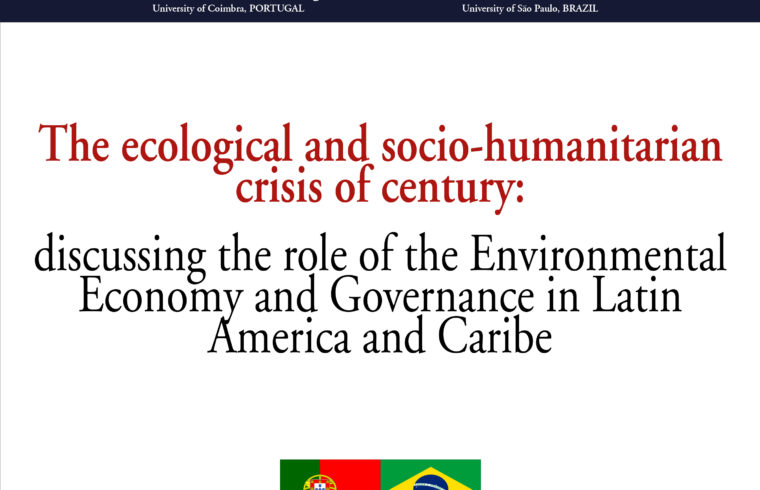Mariana Ramos Soares Beselga
University of Coimbra, PORTUGAL
João Pedro Freitas Gomes
University of São Paulo, BRAZIL
Introduction
The Stern Review: The Economics of Climate Change (2006) was a milestone around the promotion of environmental policies aimed at mitigating climate change in international organizations and at the domestic level of nation-states, given that the ecological crisis will directly affect the economy globally, being considered by many experts as the biggest market failure (Stern & Stiglitz, 2021). The report showed that the effects of environmental collapse can have strong impacts on production and human life, especially in underdeveloped countries, which according to the study will be the ones that will suffer most from these results, due to the history of forced development and environmental injustice in recent decades, becoming an issue of threat to peace on the globe (Stern & McFall, 2008). Thus, within the Latin American and Caribbean reality, there is a need not only for cooperation to promote environmental policies, due to ethnic-racial groups and biodiversity, which resist socio-ecological barbarism, but also for redistributive policies, which work to reduce social inequality throughout the region.
In light of the nature of the issues raised, this article focuses on the investigation of how green economic policies can be palliative measures in combating inequality and in affecting socio-cultural integration in Latin America and the Caribbean.
Therefore, this paper aims to identify how the economy’s decarbonization policies would promote greater income redistribution and the association of this convergence to the interests of transnational actors in the region, within a model of participatory environmental governance. To achieve this, the distributive impacts of the carbon tax in the Latin American and Caribbean context will be evaluated. In addition, the role of governmental and non-governmental actors and their points of convergence for promoting sustainable development and building peace was diagnosed.
Accordingly, the relevance of this scientific observation lies in the focus of analysis, which associates the conjunction between the effects of policies, with regard to the mitigation of social inequality in the regions, and a multilateral agenda which enables human rights activism and Cooperation for Development.
Issues related to decarbonization development and policies
Foremost, it is necessary to discuss the relation between pollution and development, especially in the context of developing countries. The Environmental Kuznets Curve was one of the first models that tried to understand this relationship. It proposed that, in the context of poor countries, economic development comes with an increasing environmental degradation (Stern & Stiglitz, 2021). This concept was popularized by a 1992 World Bank report which argued the following: “The view that greater economic activity inevitably hurts the environment is based on static assumptions about technology, tastes and environmental investments’ and “As incomes rise, the demand for improvements in environmental quality will increase, as will the resources available for investment”. This position was expanded and defended by several other economists in recent years, including Beckerman (1992) and Lomborg (2001). However, the only strong empirical conclusion of the EZC literature is that concentrations of pollutants may decline from middle income levels and that there is a direct correlation between income and levels of pollution, nevertheless, due to the properties of the model, it is not possible to use the EZC to get conclusions regarding additional variables, like trade (Dietz et al., 2007).
From a theoretical point of view, the EZC is also flawed. Arrow (1995) states that the EZC model, as presented in the aforementioned report, assumes that environmental damage does not impact economic activity (Stern, 2015). That is, it assumes that the economy is sustainable. However, if environmental degradation grows with the stage of economic development, trying to grow fast may be counterproductive. Besides that, Arrow also argues that a EZC kind of relationship may be a consequence of trade, not economic development, since rich countries may export more polluting activities to poorer countries, due to their relative abundance of labor and natural resources and looser regulations on environmental issues (Stern, 2009). The key conclusion of this debate is that there is not an intrinsic relationship between level of economic development and environmental degradation, therefore, it is possible to build green economies while fostering growth in developing countries.
The importance of social inclusion for Environmental Governance in Latin America and the Caribbean
Nonetheless, inequality must be considered when evaluating green policies, especially in the Latin-American and Caribbean contexts. The importance of unfairness in this policy analysis is multidimensional, since the status quo regarding inequality is high, leading to a demand for bigger redistributive policies (Klein, 2014). Furthermore, in order to address Environmental Governance in Latin America and the Caribbean, it is necessary not only to talk about States, but also about non-State actors, who have an importance in bottom-up changes (Castro et al., 2016).
This Environmental Governance Process comes from a broad perspective, which encompasses multifaceted issues, not exclusively the agents‘ interest in a new green economic model, which focuses not only on environmental conservation, but also on policies that combine the eradication of poverty and issues that guide social inclusion in the regions (Castro et al., 2016). Consequently, combating inequality is also correlated with greater democratic participation, leading to greater humanitarian social mobilization within the territories (Honorato, 2021).
Thus, Ecological Governance can be defined within a base and dispute process that will configure the control, access and use of natural resources between different actors in terms of security and regionalism (Castro et al., 2016). It can be said that the participatory model of governance emerged recently, being fundamentally antagonistic to the monolithic models that were proposed in the past, as it requires greater interaction with civil society, especially social movements, in a community way to address issues in around social justice, racism and equity, similar to interventions by a radicalized Green New Deal (Aronoff et al., 2019).
Conclusion
In this way, Latin American and Caribbean governance encompasses the participation of transactional social movements, environmentalists and other spheres in proportion to solutions on climate change and other environmental issues, such as carbon emission reduction targets, Agenda 21 and the Agreement on Biological Diversity (Castro et al., 2016). The Forum of Environment Ministers of Latin America and the Caribbean was created in 1982 and is the oldest and most relevant oversight body in the entire region, and the high commissioners constantly point out the importance of transnational activists for environmental preservation and peace promotion, tangent to their significance for the pressure for decarbonization policies and greater income redistribution in emerging countries („Fórum discutiu desafios de defensores ambientais na América do Sul | Notícias | Comissão Econômica para a América Latina e o Caribe“, 2021).
Finally, one possible design for these policies is a carbon tax, which is inherently regressive, since it is a consumption tax, therefore, the revenue from that tax must be used to fund and expand distributive policies, in order to improve the distribution of income. An example of this kind of distributive policy in the Latin context is the Bolsa Família, a program that provides financial aid to poor families in Brazil, the revenue from a possible carbon tax could be used to expand this program, hence, reducing inequality (Marques et al., 2020).
References
1. Aronoff, K., Battistoni, A., Cohen, D., Riofrancos, T., & Klein, N. (2019). A Planet to Win. Verso.
2. Castro, F., Hogenboom, B., & Baud, M. (2016). Environmental Governance in Latin America. Palgrave Macmillan.
3. Dietz, S., Hepburn, C., & Stern, N. (2007). Economics, Ethics and Climate Change. SSRN Electronic Journal. https://doi.org/10.2139/ssrn.1090572
4. Fórum discutiu desafios de defensores ambientais na América do Sul | Notícias | Comissão Econômica para a América Latina e o Caribe. Cepal.org. (2021). Retrieved 25 June 2021, from https://www.cepal. org/pt-br/noticias/forum-discutiu-desafiosdefensores- ambientais-america-sul.
5. Honorato, R. (2021). O Acordo de Escazú: democratizando a governança climática e ambiental latinoamericana – Observatório de Regionalismo. Observatorio. repri.org. Retrieved 25 June 2021, from http:// observatorio.repri.org/2020/08/04/o-acordo-deescazu- democratizando-a-governanca-climaticae- ambiental-latino-americana/.
6. Klein, N. (2014). This Changes Everything: Capitalism vs. the Climate. Simon and Schuster.
7. Marques, P. R.; Ribas, T. & Carvalho, L. (2020). Como neutralizar os efeitos regressivos de uma tributação sobre carbono no Brasil? (Nota de Política Econômica no 005). MADE/USP.
8. Stern, D. (2015). The Environmental Kuznets Curve after 25 Years. SSRN Electronic Journal. https:// doi.org/10.2139/ssrn.2737634
9. Stern, N., & McFall, J. (2008). Climate change and the Stern Review. Stationery Office.
10. Stern, N., & Stiglitz, J. (2021). The Social Cost of Carbon, Risk, Distribution, Market Failures: An Alternative Approach. https://doi.org/10.3386/ w28472
11. Stern, N. (2009). Imperfections in the Economics of Public Policy, Imperfections in Markets, and Climate Change. SSRN Electronic Journal. https://doi. org/10.2139/ssrn.1516252
12. Stern, N. Stern Review (2006). The Economics of Climate Change.








